Education, Skills, and the Labour Market
It is undisputed that the human capital of a nation accumulated through schooling and lifelong learning is crucially important to the economy’s innovative capacity and ability to compete in the globalized world of the 21st century. At the individual level, human capital can be regarded as skills that make workers more productive in performing their work tasks and as the knowledge and competencies that enable people to generate and adopt new ideas that spur innovation. At the macroeconomic level, human capital can accelerate economic growth by increasing aggregate productivity and by facilitating the creation and diffusion of new technologies.
One stream of research in the group “Education, Skills, and the Labour Market” deals with the formation of skills. The focus is on family background, formal education, and on-the-job training as determinants of skill development. In terms of family influences, we see substantial intergenerational persistence between parents and children in income, educational attainment, and occupational choices. One source of this persistence is the intergenerational transmission of cognitive skills, as we show using unique Dutch data that link comparable measures of math and language skills over generations.
However, family circumstances are not “self-inflicted” and are beyond the control of the individual; Nobel laureate James J. Heckman coined them “accident of birth”. Thus, differences in family background and support are a source of inequality – the lack of equality of opportunity. We study the effectiveness of policies to support children and youths from disadvantaged families, in particular, early child care and mentoring programmes. However, one fundamental challenge with formally non-selective programmes such as universal child care is that disadvantaged families are often less able to access and utilize these programmes.
In a series of field experiments, we investigate why disadvantaged families are underrepresented in such programmes, focusing on both demand side reasons (e.g., lack of information or difficulties navigating complex application processes) and supply side reasons (e.g., discrimination of educational providers).
Related to our research on economic inequality at the individual level, we also study inequality at the regional level. Regional economic disparities, to a large extent driven by firms located in certain regions, can promote other forms of regional disparities. One such dimension in many western societies is the rise of radical right parties since the late 1980s. We contribute to this discussion by trying to understand the role of firm- und regional-level adjustments to globalization and technological change at the disaggregated European level. Particularly, we study how these significant economic changes affect vote shares of populist and nationalist parties because of the economic hardship caused by these phenomena.
Of particular interest in the research group “Education, Skills, and the Labour Market” is the intersection of labour market, education, and innovation research. As technology is changing the tasks workers perform at the job, automating certain tasks and introducing new tasks in which humans have a comparative advantage, the skills required from workers also change. A series of research projects aims at improving our understanding of the interplay between technology, skill supply, and skill demand.
For instance, we derive novel measures of worker skills by exploiting the unique setting of the German apprenticeship system, which mandates that the same practical and theoretical skills are developed in a particular apprenticeship regardless of the training location in Germany. Linking these skill measures to rich administrative labour market data, we estimate the returns to various types of skills developed during apprenticeship training, such as cognitive, social, digital, and manual skills.
Moreover, the analysis of apprenticeship plan updates will be informative about which types of skills have become more (or less) important over time, and how this interacts with the tasks that new technologies are able to perform. Furthermore, merging workers’ skill supply from apprenticeship plans with firms’ skill demand from online job vacancies allows us to investigate whether returns to skills are systematically higher in firms which require these skills. This will shed light on the complementarities between technologies and skills.
We also investigate the differences in entrepreneurship and business dynamism and their respective contributions to growth between the United States and Germany, particularly focusing on the significance of startups. While startups in the United States are well-known for their innovation and radical advancements, evidence suggests that Germany's innovation is more concentrated within established firms (i.e., incumbents). In a comparative analysis between Germany and the United States, we aim to delve into the preferences of high-skilled individuals for working in startups (vs. incumbents), to better understand the factors influencing startup activity and success in both countries.
In addition to the Germany-U.S. comparison, we will also shed light on the question to what extent the relatively low entrepreneurship rate in East Germany can be explained by individuals’ tastes for working in a startup. Starting from the observation that Germany is highly innovative and competitive despite having few startups, we then discuss how the German economy still maintains high levels of innovativeness and competitiveness.
Workpackage 1: (Unequal) Access to Education and the Formation of Skills
Workpackage 2: Returns to Skills
Workpackage 3: Innovation and Business Dynamism in Germany and the United States
Research Cluster
Productivity and InstitutionsYour contact

- Department Structural Change and Productivity
Refereed Publications
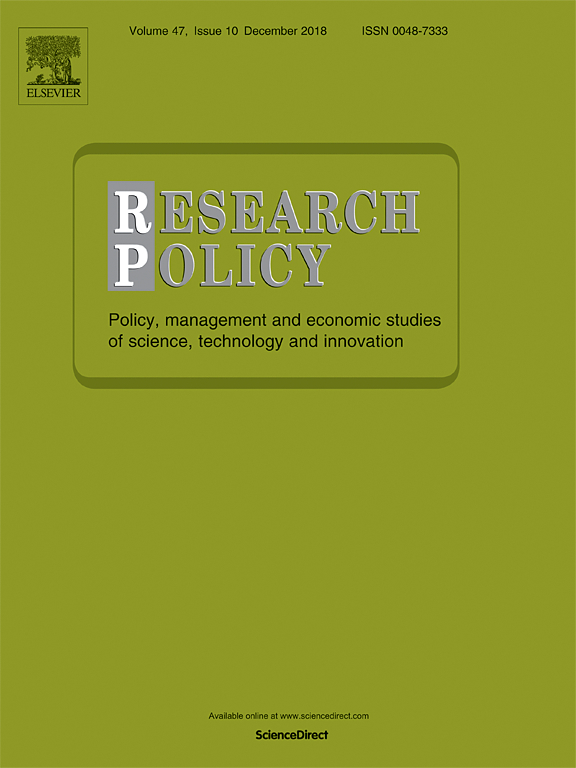
Skill Mismatch and the Costs of Job Displacement
in: Research Policy, No. 2, 2024
Abstract
Establishment closures have lasting negative consequences for the workers displaced from their jobs. We study how these consequences vary with the amount of skill mismatch that workers experience after job displacement. Developing new measures of occupational skill redundancy and skill shortage, we analyze the work histories of individuals in Germany between 1975 and 2010. We estimate difference-in-differences models, using a sample of displaced workers who are matched to statistically similar non-displaced workers. We find that displacements increase the probability of occupation change eleven-fold. Moreover, the magnitude of post-displacement earnings losses strongly depends on the type of skill mismatch that workers experience in such job switches. Whereas skill shortages are associated with relatively quick returns to the earnings trajectories that displaced workers would have experienced absent displacement, skill redundancy sets displaced workers on paths with permanently lower earnings. We show that these differences can be attributed to differences in mismatch after displacement, and not to intrinsic differences between workers making different post-displacement career choices.

Exposure to Conflict, Migrations and Long-run Education and Income Inequality: Evidence from Bosnia and Herzegovina
in: Defence and Peace Economics, No. 8, 2023
Abstract
We investigate the long-term relationship between conflict-related migration and individual socioeconomic inequality. Looking at the post-conflict environment of Bosnia and Herzegovina (BiH), a former Yugoslav state most heavily impacted by the wars of the early 1990s, the paper focuses on differences in educational performance and income between four groups: migrants, internally displaced persons, former external migrants, and those who did not move. The analysis leverages a municipality-representative survey (n ≈ 6,000) that captured self-reported education and income outcomes as well as migration histories. We find that individuals with greater exposure to conflict had systematically worse educational performance and lower earnings two decades after the war. Former external migrants now living in BiH have better educational and economic outcomes than those who did not migrate, but these advantages are smaller for external migrants who were forced to move. We recommend that policies intended to address migration-related discrepancies should be targeted on the basis of individual and family experiences caused by conflict.

Males Should Mail? Gender Discrimination in Access to Childcare
in: American Economic Association Papers and Proceedings, May 2023
Abstract
This study investigates discrimination against women when searching and applying for childcare in a nationwide field experiment. We send emails from fictitious parents to 9,313 childcare centers in Germany inquiring about access to childcare. We randomize whether the email is sent by the child's mother or father. Our results show that women receive shorter and less positive responses than men. The probability of receiving a response does not differ by gender, highlighting the importance of going beyond response rates to detect discrimination. We provide suggestive evidence that regional differences in gender discrimination are related to gender norms.

The Impact of Delay: Evidence from Formal out-of-Court Restructuring
in: Journal of Corporate Finance, February 2023
Abstract
Different types of bankruptcy restructuring procedures are used in most legal systems to decide the fate of businesses facing financial hardship. We study how bargaining failures in an under-researched type of restructuring procedure, a formal out-of-the court procedure impacts the economic performance of participating firms. Croatia introduced a “pre-bankruptcy settlement” (PBS) process in the wake of the Great Recession of 2007–2009. A novel dataset provides us with annual financial statements for both sides of more than 180,000 debtor–creditor pairs, enabling us to address selection into failed negotiations by matching a rich set of creditor and debtor characteristics. Failures to settle at the PBS stage due to idiosyncratic bargaining problems, which effectively delay entry into the standard bankruptcy procedure, lead to a lower rate of survival among debtors as well as reduced employment, revenue, and profits. We are the first study to track how bargaining failures diffuse through the network of creditors, finding a significant negative effect on small creditors, but not others. Our results highlight the impact of delay and the importance of structuring bankruptcy procedures, to rapidly resolve uncertainty about firms’ future prospects.

Returns to ICT Skills
in: Research Policy, No. 7, 2021
Abstract
How important is mastering information and communication technology (ICT) on modern labor markets? We answer this question with unique data on ICT skills tested in 19 countries. Our two instrumental-variable models exploit technologically induced variation in broadband Internet availability that gives rise to variation in ICT skills across countries and German municipalities. We find statistically and economically significant returns to ICT skills. For instance, an increase in ICT skills similar to the gap between an average-performing and a top-performing country raises earnings by about 8 percent. One mechanism driving positive returns is selection into occupations with high abstract task content.
Working Papers
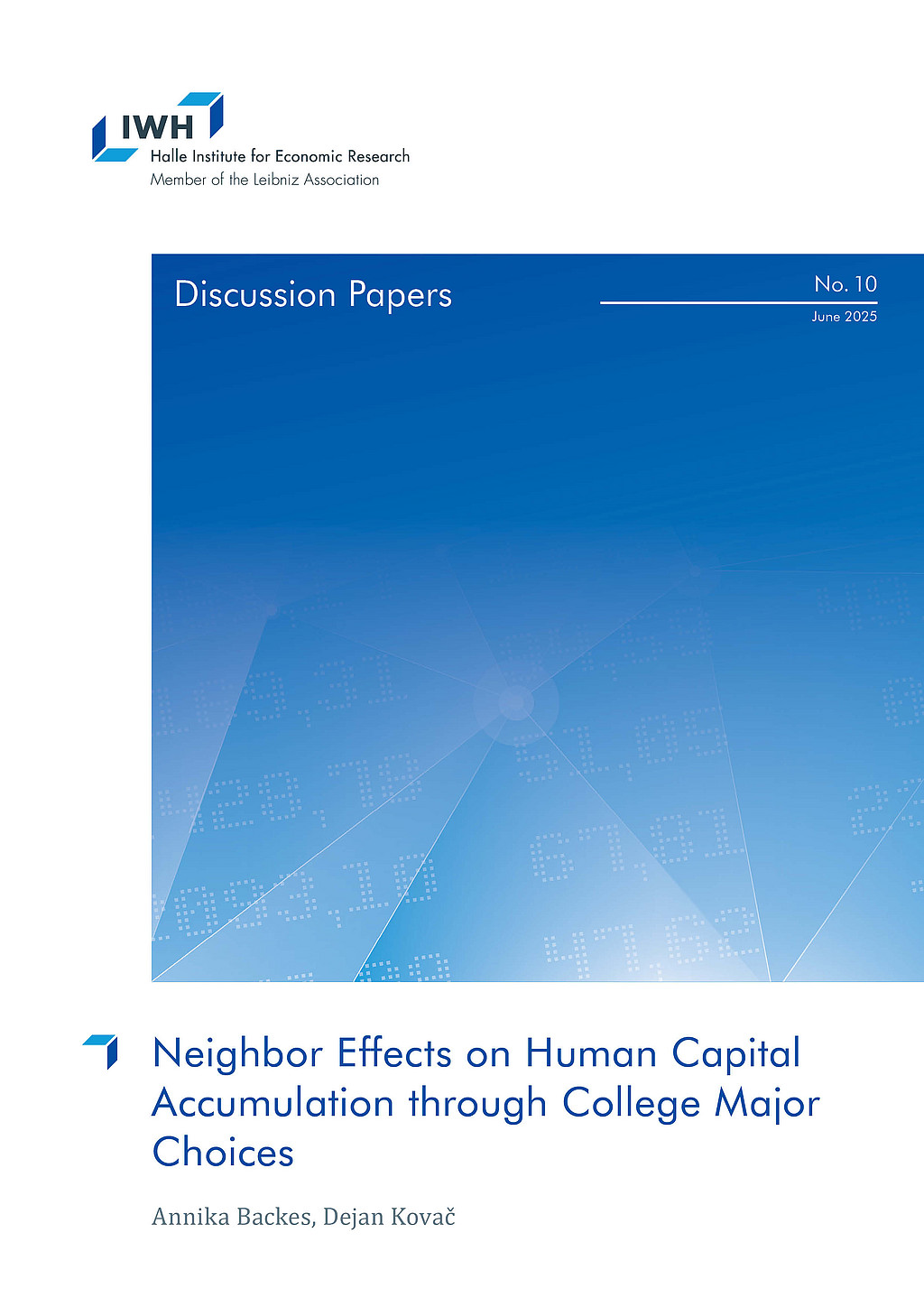
Neighbor Effects on Human Capital Accumulation Through College Major Choices
in: IWH Discussion Papers, No. 10, 2025
Abstract
<p>Using the universe of high school and college admissions data in Croatia, we geocoded nearly half a million students’ residential addresses to investigate how their college and major choices are influenced by older neighbors and peers. Using an RDD to exploit time and program variation in admission cutoffs, we find that having an older neighbor who was admitted to and enrolled in a program increases a student’s probability of applying to the program by about 20%. We find that this effect consistently holds only for the closest neighbors, both in terms of distance and age difference. Female students are more likely to be influenced by older neighbors’ choices, and male older neighbors’ admission has a larger impact on both male and female students compared to female older neighbors. The effect is stronger if the student-neighbor pair lives in a region that does not have its own university, implying that the value of information in rural areas is higher. We find evidence that students don’t follow their older neighbors to less competitive programs; instead, they are more likely to apply for the same programs their older neighbors were admitted to when the program is more prestigious. Next, we utilize the variation in weight scheme of Croatia’s college study programs to show evidence, beyond college choices, of how older neighbors affect the human capital formation of their younger peers. The main channel through which we observe this effect is during high school, through specialization in the subjects needed to gain admittance to older neighbors’ college programs. These findings shed light on the intricate dynamics shaping educational decisions and underscores the significant role older neighbors play in guiding younger peers toward specific academic pathways.</p>
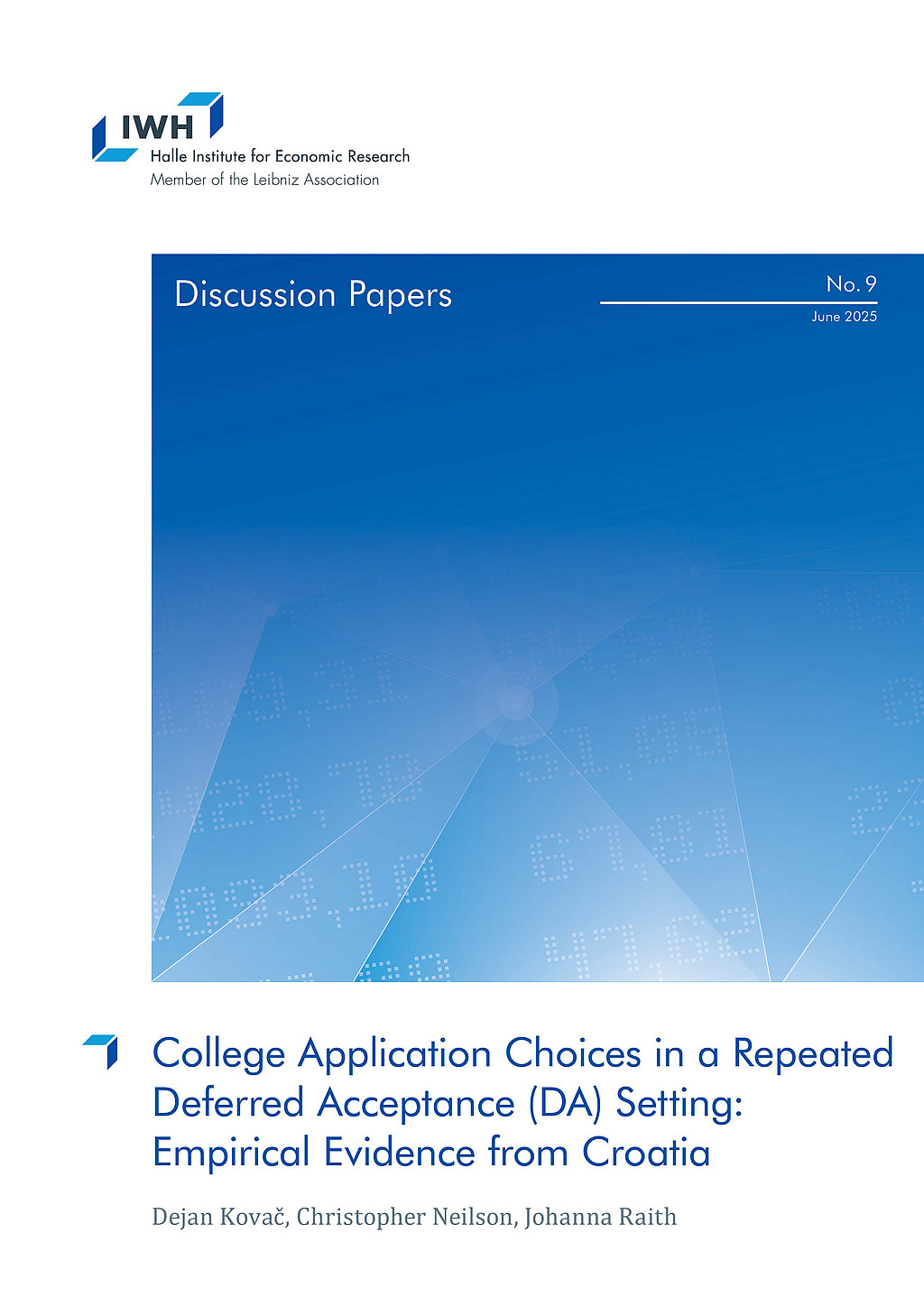
College Application Choices in a Repeated Deferred Acceptance (DA) Setting: Empirical Evidence from Croatia
in: IWH Discussion Papers, No. 9, 2025
Abstract
<p>How do beliefs on admission probability influence application choices? In this study, we empirically investigate whether and how admission probability is reflected in application choices in a centralized admission system. We exploit a novel setting of a dynamic deferred acceptance mechanism as employed in Croatia with hourly information updates and simultaneous application choices. This setting allows us to explore within-applicant strategic adjustments as a reaction to changing signals on admission probability. We show in an RDD analysis that applicants react to negative signals on admission probability with an increased propensity to adjust their application choices by 11-23%. Additionally, we show how application strategies evolve over time, while applicants learn about their admission probability. The group most-at-risk to remain unmatched improves their application choices by applying to programs with a higher admission probability towards the application deadline. Yet, we also identify a popular and potentially harmful strategy of applying to safer programs before applying to more risky “reach” programs. About a quarter of applicants have the potential to improve their application choices by resorting their application choices.</p>
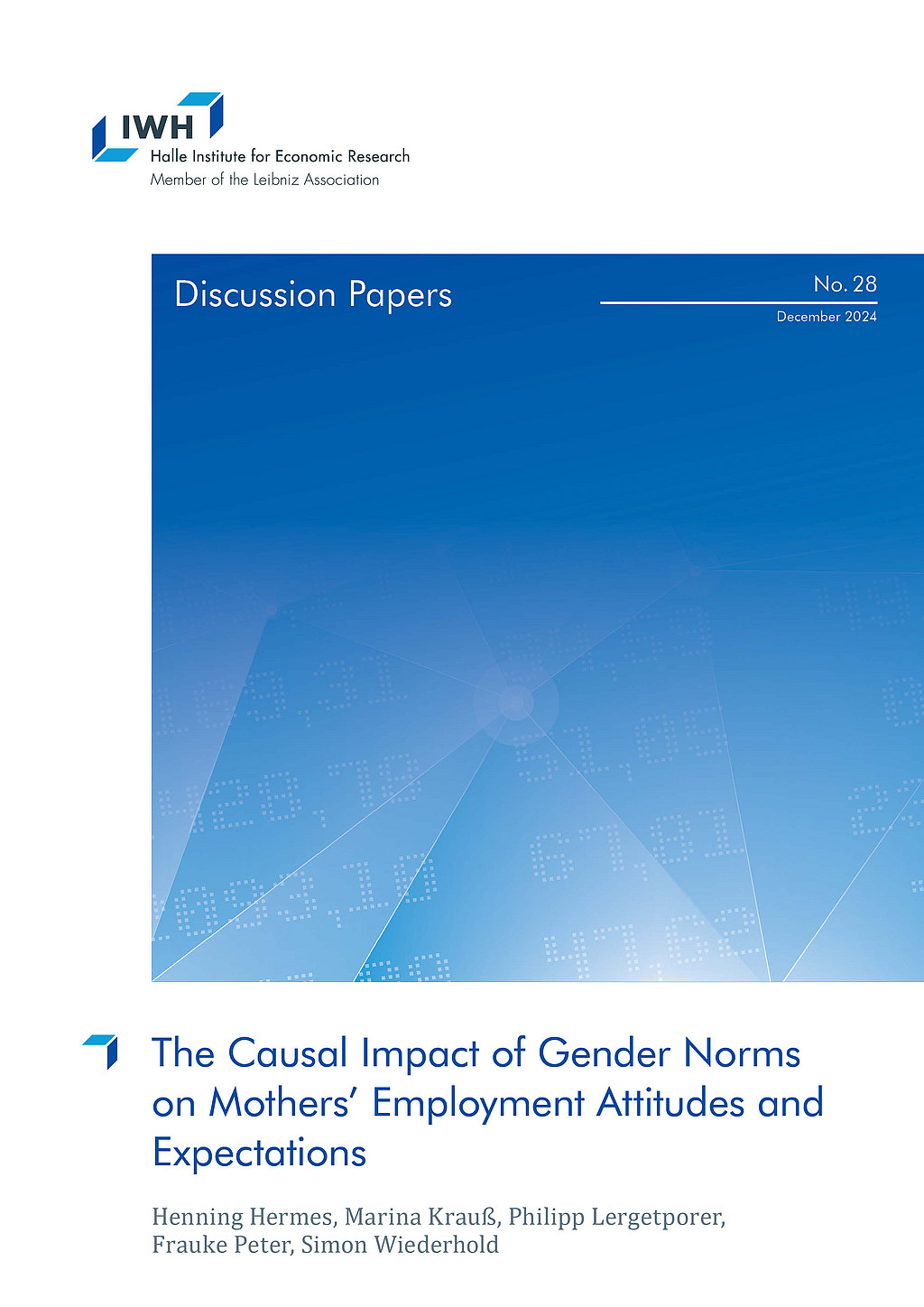
The Causal Impact of Gender Norms on Mothers’ Employment Attitudes and Expectations
in: IWH Discussion Papers, No. 28, 2024
Abstract
<p>This field experiment investigates the causal impact of mothers’ perceptions of gender norms on their employment attitudes and labor-supply expectations. We provide mothers of young children in Germany with information about the prevailing gender norm regarding maternal employment in their city. At baseline, over 70% of mothers incorrectly perceive this gender norm as too conservative – the most pronounced misperception among the various gender norms we examine. Our randomized information treatment improves the accuracy of these perceptions, significantly reducing the share of mothers who perceive gender norms as overly conservative. The treatment also shifts mothers’ own labormarket attitudes in a more liberal direction. Leveraging the fact that we assessed attitudes in a prior survey, we show that specifically the shifted attitude is a strong predictor of mothers’ future labor-market participation. Consistently, treated mothers are more likely to plan an increase in their working hours, particularly those with existing support to facilitate their employment.</p>
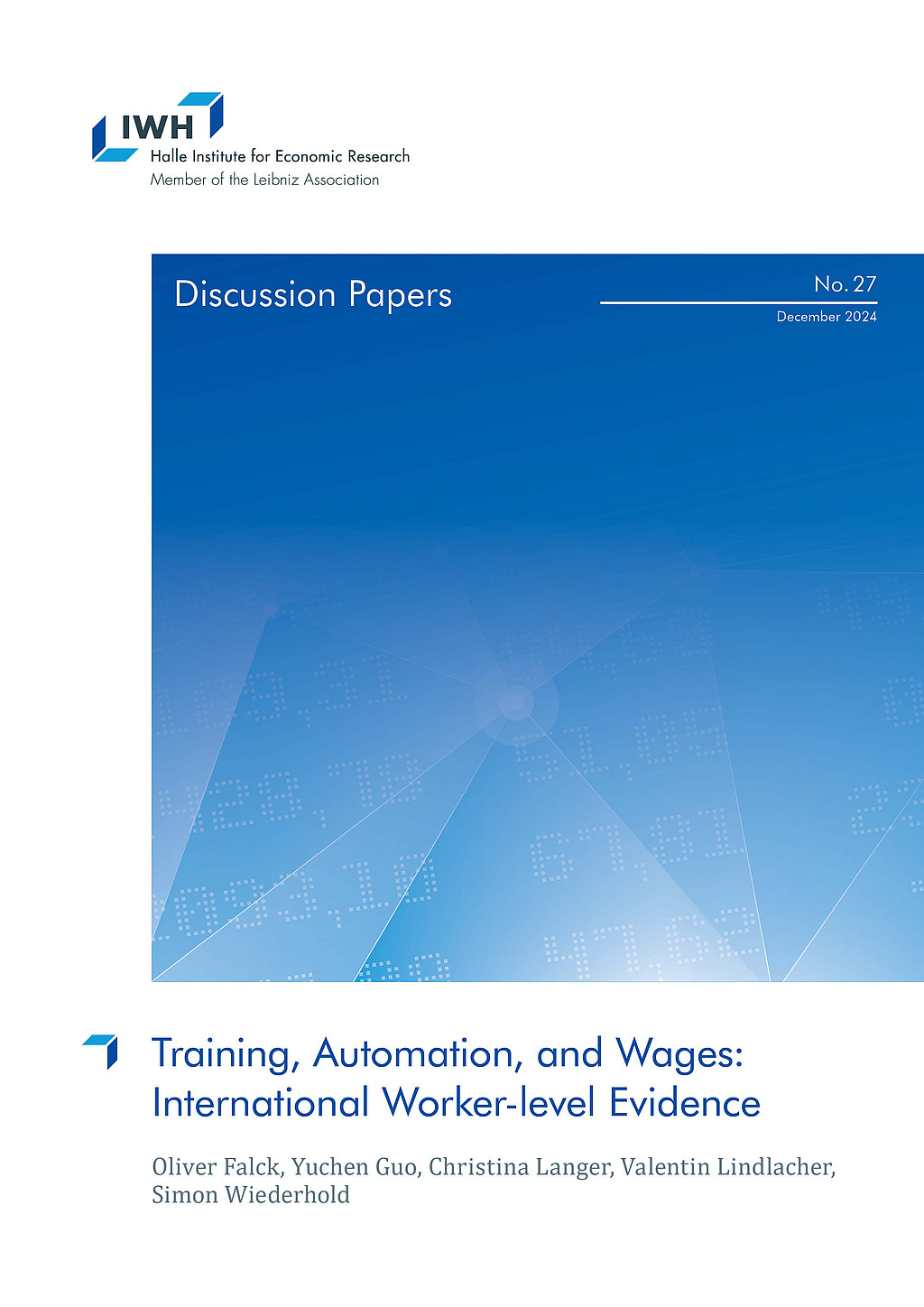
Training, Automation, and Wages: International Worker-level Evidence
in: IWH Discussion Papers, No. 27, 2024
Abstract
<p>Job training is widely regarded as crucial for protecting workers from automation, yet there is a lack of empirical evidence to support this belief. Using internationally harmonized data from over 90,000 workers across 37 industrialized countries, we construct an individual-level measure of automation risk based on tasks performed at work. Our analysis reveals substantial within-occupation variation in automation risk, overlooked by existing occupation-level measures. To assess whether job training mitigates automation risk, we exploit within-occupation and within-industry variation. Additionally, we employ entropy balancing to re-weight workers without job training based on a rich set of background characteristics, including tested numeracy skills as a proxy for unobserved ability. We find that job training reduces workers’ automation risk by 4.7 percentage points, equivalent to 10 percent of the average automation risk. The training-induced reduction in automation risk accounts for one-fifth of the wage returns to job training. Job training is effective in reducing automation risk and increasing wages across nearly all countries, underscoring the external validity of our findings. Women tend to benefit more from training than men, with the advantage becoming particularly pronounced at older ages.</p>
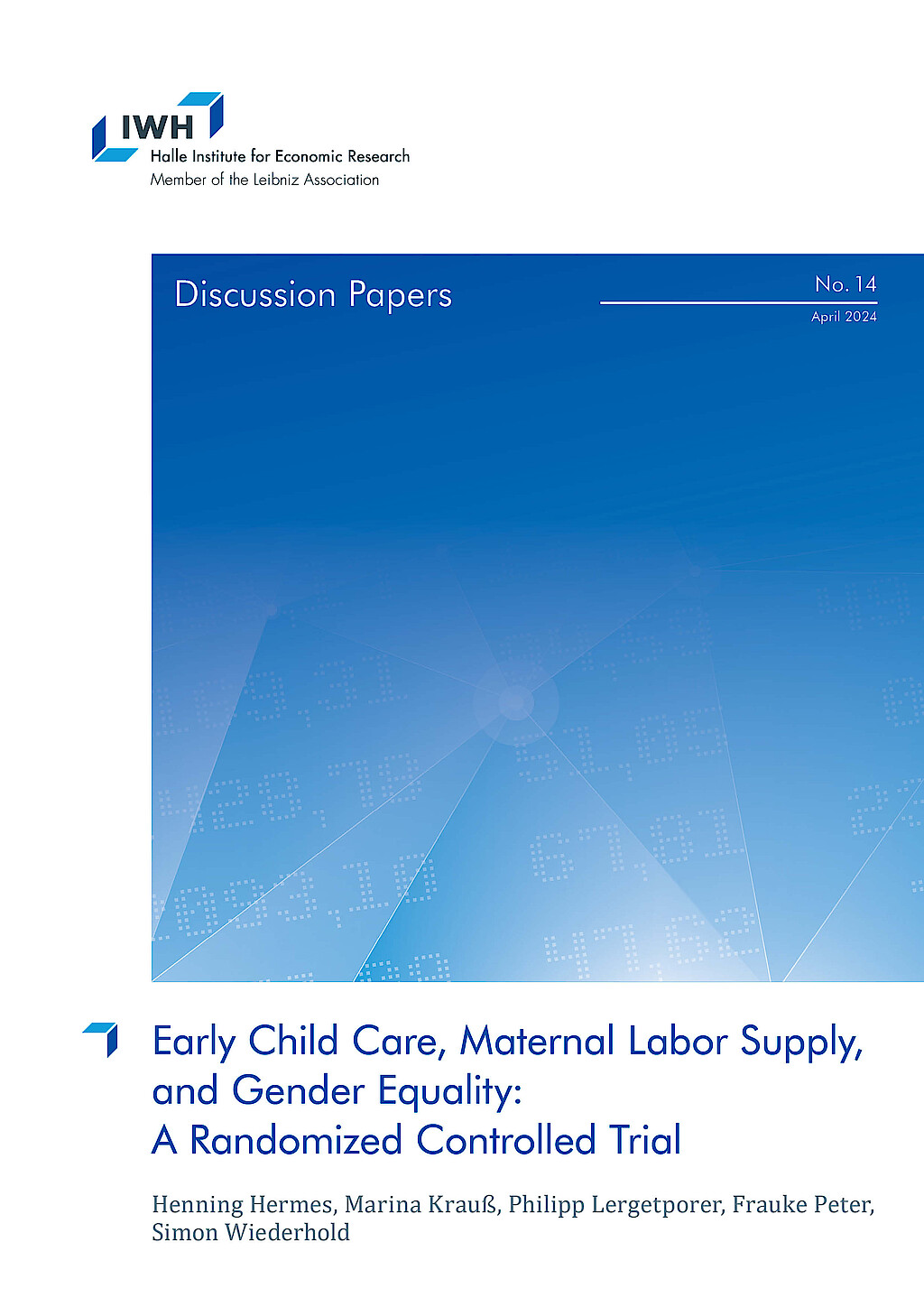
Early Child Care, Maternal Labor Supply, and Gender Equality: A Randomized Controlled Trial?
in: IWH Discussion Papers, No. 14, 2024
Abstract
We provide experimental evidence that enabling access to universal early child care increases maternal labor supply and promotes gender equality among families with lower socioeconomic status (SES). Our intervention offers information and customized help with child care applications, leading to a boost in child care enrollment among lower-SES families. 18 months after the intervention, we find substantial increases in maternal full-time employment (+160%), maternal earnings (+22%), and household income (+10%). Intriguingly, the positive employment effects are not only driven by extended hours at child care centers, but also by an increase in care hours by fathers. Gender equality also benefits more broadly from better access to child care: The treatment improves a gender equality index that combines information on intra-household division of working hours, care hours, and earnings by 40% of a standard deviation, with significant increases in each dimension. For higher-SES families, we consistently observe negligible, insignificant treatment effects.












